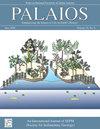深层生物地球形态学2:作为古代生态系统工程师的动物
IF 1.5
4区 地球科学
Q2 GEOLOGY
引用次数: 0
摘要
这套专题集是两卷书中的第二卷,深入探讨了生命和沉积环境在深部时间的共同进化。虽然生命-沉积物相互作用的整个范围太广,无法完全涵盖,但在这两卷中,这一组提供了不同生物如何与整个显生宙的沉积环境相互作用的例子。这两组的第一组主题集中在石炭纪至上新世的植物-沉积物相互作用上(Davies等人,2022),而第二组主题则是“动物”;记录后生动物和它们所处环境之间相互作用的例子。在第一个主题集的介绍中,本文章由计算机程序翻译,如有差异,请以英文原文为准。
DEEP TIME BIOGEOMORPHOLOGY 2: ANIMALS AS ANCIENT ECOSYSTEM ENGINEERS
This thematic set is the second of a pair of volumes delving into the co-evolution of life and sedimentary environments in deep time. Whilst the full gamut of life-sediment interactions is far too vast to cover in its entirety, across both volumes this set provides examples of how different organisms have interacted with sedimentary environments across the entirety of the Phanerozoic. The first thematic set of this pair focused on plant-sediment interactions from the Carboniferous to the Pliocene (Davies et al. 2022), whereas this second set has a loose running theme of ‘animals’; documenting examples of interactions between metazoans and the environments that they occupied. In the introduction to first thematic set,
求助全文
通过发布文献求助,成功后即可免费获取论文全文。
去求助
来源期刊

Palaios
地学-地质学
CiteScore
2.80
自引率
12.50%
发文量
40
审稿时长
6 months
期刊介绍:
PALAIOS is a monthly journal, founded in 1986, dedicated to emphasizing the impact of life on Earth''s history as recorded in the paleontological and sedimentological records. PALAIOS disseminates information to an international spectrum of geologists and biologists interested in a broad range of topics, including, but not limited to, biogeochemistry, ichnology, paleoclimatology, paleoecology, paleoceanography, sedimentology, stratigraphy, geomicrobiology, paleobiogeochemistry, and astrobiology.
PALAIOS publishes original papers that emphasize using paleontology to answer important geological and biological questions that further our understanding of Earth history. Accordingly, manuscripts whose subject matter and conclusions have broader geologic implications are much more likely to be selected for publication. Given that the purpose of PALAIOS is to generate enthusiasm for paleontology among a broad spectrum of readers, the editors request the following: titles that generate immediate interest; abstracts that emphasize important conclusions; illustrations of professional caliber used in place of words; and lively, yet scholarly, text.
 求助内容:
求助内容: 应助结果提醒方式:
应助结果提醒方式:


